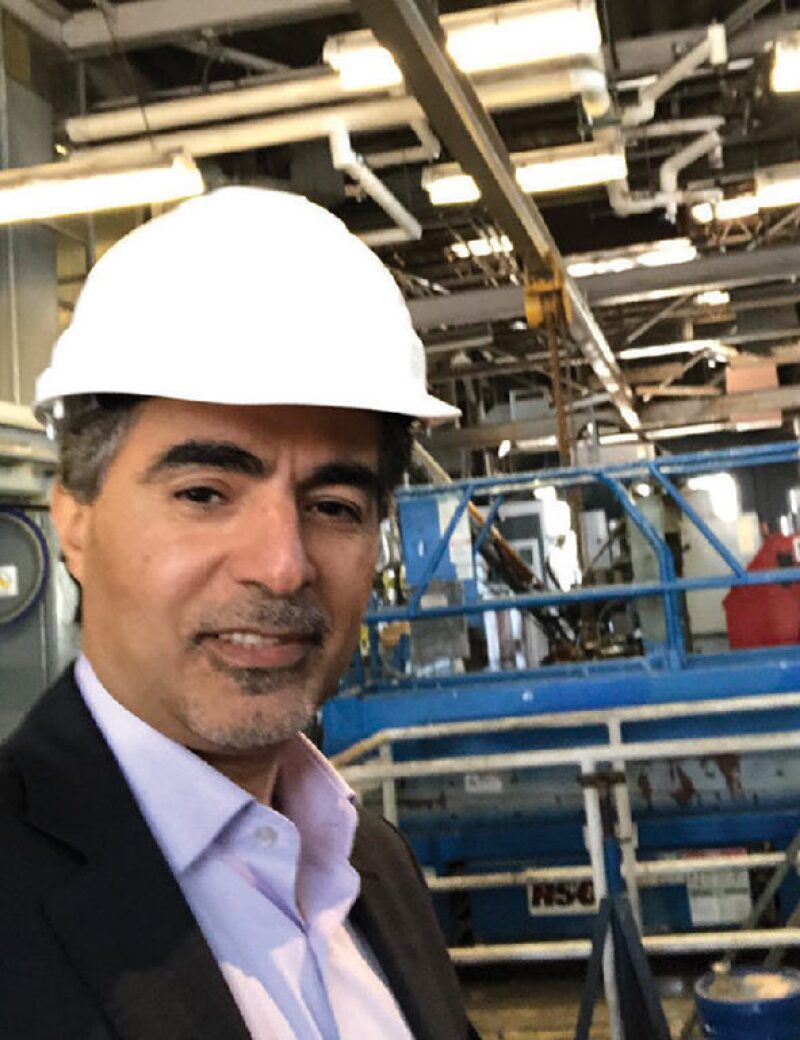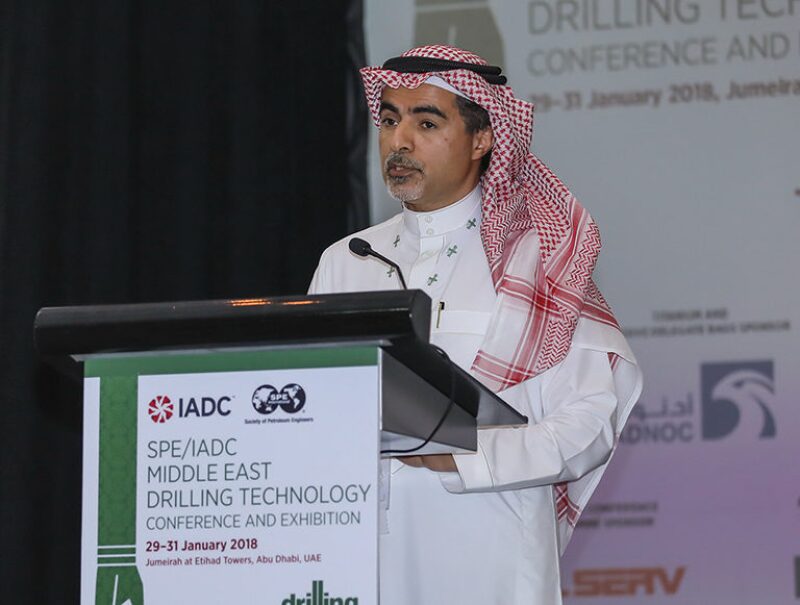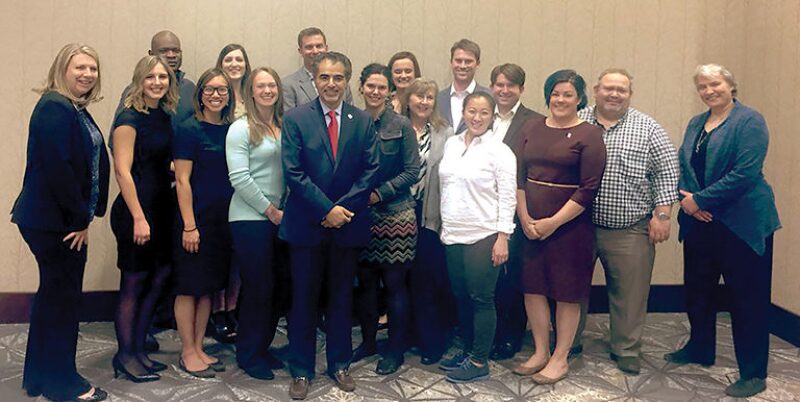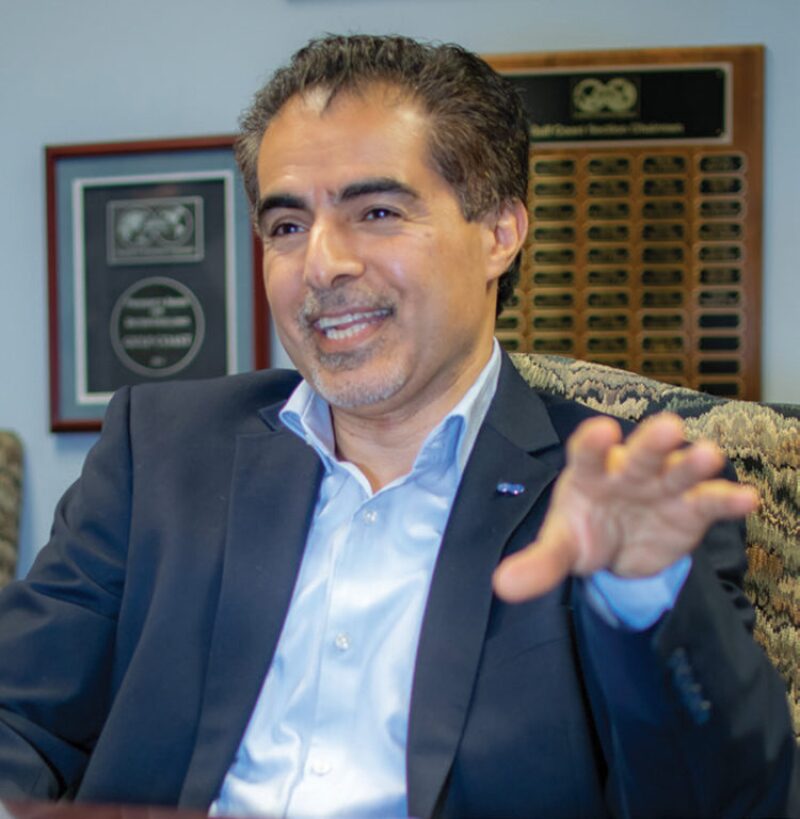Sami Alnuaim has been with Saudi Aramco for 31 years, where he has worked in reservoir engineering, production engineering, research and development, and at the upstream computer center. He currently serves as manager, Petroleum Engineering Application Services, where he has full responsibility for providing technical information technology support to all upstream operations, including exploration, drilling, production, reservoir engineering, and facility design.
Alnuaim has a long history of service to SPE and has been a member of the SPE Middle East Board of Directors. He has won several local, regional, and international awards, including the SPE Regional Service Award for the Middle East in 2010 and the SPE Distinguished Service Award, and became an SPE Distinguished Member in 2011. He also has served on the society’s DeGolyer, Rand, and McConnell Awards Committee and the 2017 SPE Annual Technical Conference and Exhibition Executive Advisory Committee.
He has published a number of technical papers, holds several patents related to well performance, and teaches petroleum engineering at King Fahd University of Petroleum and Minerals (KFUPM). Alnuaim serves on the petroleum engineering department advisory boards at KFUPM and King Saud University. He is a key figure in the Saudi and Middle Eastern energy and media sectors, having published more than 300 articles on oil and gas and energy in Saudi newspapers.
Alnuaim obtained BS and MS degrees from KFUPM, and a PhD degree from the University of Texas at Austin, all in petroleum engineering. He completed the Wharton Executive Management Program at the University of Pennsylvania and the Advanced Asian Business and Culture Program from the Center for Global Business Studies at Pennsylvania State University.
What would you like to accomplish during your term of office?
In addition to implementing the recently revised SPE Strategic Plan, my top priority will be to show the world that the role of the oil and gas industry is not limited to supporting the global economy, but also improving individuals’ lifestyles while being good stewards of the environment and enabling social development. During my term, I will focus on these specific goals:
- Improving the oil and gas industry’s image by redefining the concept of sustainability to focus on the industry’s efforts to ensure sustainable, affordable, and cleaner hydrocarbon-based energy sources that support the global economy, improve lifestyle and social development, and take care of the environment.
- Correcting misconceptions and pessimistic outlooks about the future of the oil and gas industry.
- Implementing the recently revised SPE Strategic Plan, which puts more emphasis on the environment and social development, in addition to promoting advances and excellence in technology and knowledge collection and dissemination.
- Building bridges among academic petroleum engineering departments around the world so they can share best technical programs and curricula and strengthen their programs by reflecting recent advances in technology and engagement with communities.
Now that the industry downturn appears to be over, what is the most valuable thing SPE can offer its members?

First, I do not think that the downturn is completely over. Indeed, we, as an industry, are in a much better condition now compared with a year ago but we should remain vigilant and well-prepared for the worst. The million-dollar question that remains is “what oil price indicates that the downturn is over?”
I personally wish for a sustainable oil price that does not hurt global economic growth or curb oil and gas industry investment. Let’s not forget that the global economy relies heavily on oil and gas. Hence, our industry needs significant investment to discover and develop new hydrocarbon resources to offset natural annual decline as well as to meet the anticipated increase in global energy demand. The most important thing that SPE can do is to remain relevant to its members and provide them with the tools and knowledge to help them achieve not only their personal goals but their professional and company goals. We need to focus on evolving technical and soft skills developments to help our members do their jobs with excellence and, most importantly, in a cost-effective, safe, and environmentally-aware manner. Our programs and services must continue to evolve at all levels, for the senior professional, the young professional, and students. We need to empower all members with what it will take to maintain excellent leadership in the energy sector for many years to come.
What role do associations such as SPE play in difficult times? What is the primary role they play in times of industry recovery?
During downturn and recovery cycles, the role of technical associations, including SPE, is strategic and important. Some technical associations can be severely affected economically during bad times, which hampers them from implementing their mission and serving their members. What distinguishes one association from another is its strategy and capability to overcome bad times, so that it keeps serving its valuable members while also improving its programs and services to help its members and the industry at large overcome the downturn. SPE, through its board and executive leadership, is one such association that has proved that it can meet those challenges. During the downturn, SPE continued to serve its members well while improving programs and knowledge transfer to maintain its leadership role in the upstream sector. SPE events have focused on knowledge dissemination and innovative solutions as well as advanced technologies and skills to help members and companies improve efficiency, reduce cost, and maintain excellence in safety, community service, social development, and environmental care.
Describe how you got involved in SPE.
SPE has been the driving force behind not only my professional growth, but also my leadership skills development. I still remember the year I joined the society during my BS degree years at King Fahd University of Petroleum and Minerals (KFUPM) in Dhahran, Saudi Arabia, in the early 1980s. I have fond memories of the happiness I felt when I received my student membership card and my first copy of JPT. I am grateful to the KFUPM faculty members who encouraged me and other petroleum engineering students to join this great association.

How has being a member of SPE affected your career?
Since the early 1980s, SPE membership has been my main venue to expand my technical knowledge, leadership skills, and international network. I still remember the first technical paper I presented, at the Middle East Oil Show 1991 in Bahrain. Since then, my engagement with SPE has expanded into chairing and co-chairing several SPE workshops, forums, committees, and conferences, and also presenting papers and participating as a keynote speaker at various conferences as well as chairing the SPE Saudi section.
Through this SPE journey, my professional and career advancement became much clearer and stronger. In addition to serving the society at all levels for more than 30 years, SPE gave me recognition and an international network through honoring me with several awards at the Middle East and international levels. And my participation as a board member in the Middle East region exposed me to SPE international governance and excellence. Indeed, I was honored to be the second professional from Saudi Aramco to be selected SPE President.
What in your background has prepared you for this position?
I have more than 30 years of experience in the industry with a broad technical and managerial oil and gas industrial background, complemented with solid academic exposure and achievements. My experience with Saudi Aramco’s upstream organization includes leading strategic projects and managing operations in production, reservoir management, research and development, and information technology. My commitment toward academia is apparent through my support of the petroleum engineering departments at King Fahd University of Petroleum and Minerals and King Saud University in Dhahran and Riyadh, Saudi Arabia. I serve on the advisory boards of both, and have taught graduate courses for more than 10 years, a role which includes supervising graduate students and securing funds for minority graduate students to attend regional SPE conferences to present their work. I also served 5 years on the advisory board of PetroSkills, helping to address global oil and gas training needs.

What is your perception about the role of SPE among national oil companies?
Throughout the history of SPE, through its leadership and support of the oil and gas industry, it has gained the trust of national, international, and service companies as well as academia and research centers. You can see this well-deserved trust and respect in the extraordinary support that SPE gets from these companies. I can recall several CEOs and executives of national, international, and service firms who have highlighted their partnership with SPE. The association is looked at by the industry as an independent, non-political, not-for-profit technical association that supports the entire oil and gas industry, which distinguishes it from all commercial organizations. One of my roles as president is to maintain and strengthen such partnerships.
Public scrutiny of the oil and gas industry has increased over the past decade, in particular because of the issue of climate change. How should SPE members react to this increased public interest in the industry?

This is one of the biggest challenges and misconceptions facing our industry, and I think we must play a role in correcting misconceptions. Our industry is investing billions of dollars to be a significant partner in addressing the issue of climate change. We are improving energy efficiency, reducing emissions, and enabling technologies such as CO2 capture and sequestration.
Sustainability is not only providing affordable energy as cleanly and efficiently as possible, but also investing in future advanced technologies to ensure that energy remains available for centuries to come. Increasing the availability of affordable energy promotes economic development of both producing and consuming countries. Most importantly, it can put a smile on the faces of people around the world.
SPE recently created a new international sustainability award to be given for the first time next year to recognize work in this area. Our members should be active in their communities in engaging with issues such as this, explaining how the industry is addressing this and other challenges.
What is the main message you would like to communicate to SPE members?
My message to our members is the following: excellence and pride are our values and we need to preserve them. The world is looking to us for their current and future energy needs. SPE members will greatly contribute to ensuring that those energy needs are met and we should feel pride in doing so. SPE will offer the environment and programs and services to allow its members to thrive.
The future is promising for the oil and gas and the industry, which will evolve to cope with upcoming challenges. The oil and gas industry welcomes and encourages developments in energy efficiency and renewables, especially in power generation. Nonetheless, hydrocarbons will continue to dominate the global energy map, especially in transportation, and will remain a key tool for improving the lifestyle of those who currently lack access to energy. The question for our members is: Do you want to be part of this exciting journey and reaching these noble goals? Are you going to be proud of doing it? I am sure that the answer to both questions would be YES.


